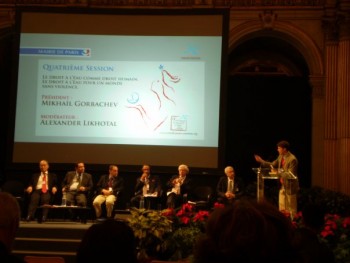Among the Human Rights Heroes

Grant Firestone asking a question onstage at the World Summit of Nobel Peace Prize Laureates in Paris.
Details
While studying in Paris during the fall semester, Grant Firestone ‘10 had the rare chance be part of a summit meeting that brought together Nobel Peace Prize laureates and human rights leaders from around the world. He wrote this account of his experience, which appeared in a slightly different version in his Wilmington, Delaware, hometown newspaper.
The Ninth World Summit of Nobel Peace Prize Laureates was held in Paris Dec. 11-13, and thanks to Haverford College classmate Dean Granoff, '08, whose father Jonathan Granoff was one of the organizers, I was provided a wonderful opportunity to participate. The summit is organized by the Permanent Secretariat of Nobel Peace World Summits, a partnership of the International Gorbachev Foundation, the City of Rome, and in 2009, the Mairie (mayor's office) of Paris. The conference exists to spread world peace and this year was especially significant: it was the 60th anniversary of the ratification of the Universal Declaration of Human Rights.
Attendees included Polish activist Lech Walesa, Ingrid Betancourt (the Columbian presidential candidate who was kidnapped and held for six years by an insurgent group) and France's First Lady Carla Bruni. Bono from U2, was honored at the event with the Nobel Peace Prize Summit Award for activism against AIDS with the ONE Campaign.
The summit's mission for this year was:“Human Rights and a World Without Violence.” Its sessions touched on how we can build peace through safeguarding human rights; strategies to affirm the universalism of the fundamental rights; how to ensure individual rights in today's world; how to foster the establishment of democratic values worldwide, and how to make rights concrete by eliminating social and financial inequalities among people.
Leading up to the Summit, I was charged with creating a list of questions for the laureates and organizing students to participate. Despite this singular opportunity, it proved to be difficult, because it was our last weekend in Paris, and we had final exams. In the end, there were eight of us: one master's student and the rest undergrads from various schools in the U.S., among them my Haverford classmate Herman Marcia '10. Also attending was Laura Nuyen '08.
Summit organizer Jonathan Granoff, President of Global Securities Institute, met with us before the conference. He talked about how global problems would be discussed in a forum that can really make a difference. All of us were getting more and more excited about the upcoming experience. Excited, and with ideas forming, my student friends headed to a café after the meeting to solidify the questions we were going to ask.
The next morning, we met in front of the Hôtel de Ville (City Hall), at 8:30 a.m., ready for the first day of the conference. The three-day event's lessons would prove to be wide-ranging and astounding.
Betty Williams of Ireland, who won the Nobel in 1976, for helping resolve political conflicts in Northern Ireland, spoke on her new project, City of Peace, which aims to create safe havens for children where they will be cared for and educated. The first“City of Peace” will be built in Basilicata, Italy.
Kerry Kennedy, daughter of Robert F. Kennedy and Executive Director of the Robert F. Kennedy Memorial, listed statistics of crimes against women, and concluded with a rousing call: take that anger and go out and act.
Another session dealt with the human right to water. Alexander Likhotal of the Gorbachev Foundation quoted the Egyptian Book of the Dead in which the fifth requirement for the dead is that they have not impeded the flow of water or deprived any person of it.
Massimo Barra from the International Red Cross/ Red Crescent Commission spoke of empowerment and advocacy. Every time human rights are in danger, we must act, she said, so we must fight for those who do not have the means to fight for themselves.
Kevin Bales, President of Free the Slaves talked about the existence of slavery. He said that 27 million slaves exist in the world today (twice the number of slaves taken from Africa in the three and a half years of the Trans-Atlantic Slave Trade), and account for 50 billion dollars of commerce annually.
The last session ended with a plea by Mairead Corrigan Maguire (Williams' Nobel co-recipient) to the Burmese (Myanmar) military rulers to release ‘91 Nobel laureate and democracy activist Aung San Suu Kyi.
During the final press conference, I asked President de Klerk of South Africa one of the questions I had prepared.“How can we use globalization with all the technology and information-sharing to spread democracy in the fight for Human Rights?” I asked.
He explained how activists try to reach as many people as possible with technology, and stressed the importance of using globalization for human rights.
At first I was a little nervous to be asking questions, but in the end, we were all a little disappointed that we could not ask more, for the interaction was electric.
This conference was one of the most interesting and eye-opening three days I have ever experienced. It was an experience that filled me with optimism.
I hear people at school talking about activism all the time. But it can get tiring when words talk bigger than actions. Here in Paris though, we were surrounded by experts who have already made huge differences in the world. One thought kept coming back to me: what makes a hero? Is the person born with the special substance, is it something they learned growing up, or was it the circumstance in which they found themselves? Perhaps it's all three. Whatever the ingredients, the Laureates were inspirational.
--Grant Firestone
For more information, visit www.NobelforPeace.org



